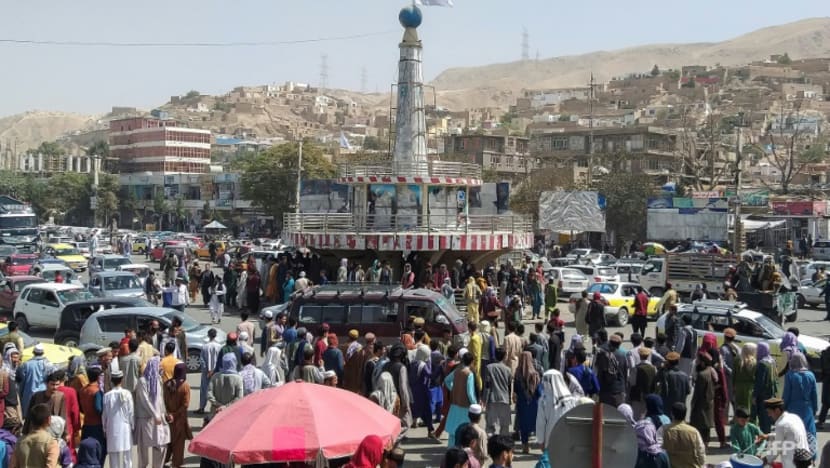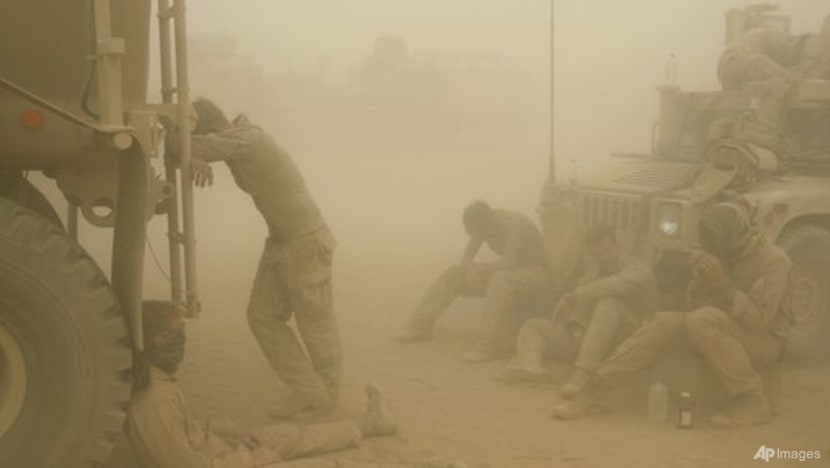Commentary: Global war on terror derailed by Afghanistan blunder
The war on terror was already faltering. The blunder in Afghanistan has made the rebirth of global terror highly likely, says Brahma Chellaney.

A Taliban flag now looms over the city of Pul-e-Khumri
NEW DELHI: The American-led global war on terror, launched 20 years ago after the Sep 11, 2001, attacks against the United States, was already faltering before President Joe Biden took office.
Now it may not recover from the blow delivered by Biden’s historic blunder in facilitating the Taliban’s return to power in Afghanistan.
The flag of the world’s deadliest terrorists - responsible for killing over 2,000 US soldiers since 2001 - will flew above Kabul on the 20th anniversary of the 9/11 attacks.
By empowering the Taliban, Biden has empowered all violent extremist groups, thus making the rebirth of global terror highly likely. And by betraying one ally, the Afghan government, he has made other American allies feel that the US could abandon them, too, when the chips are down.
The victory will soon give rise to a terrorist super-state - a haven for transnational fanatics and a magnet for those from around the world seeking training to carry out attacks back home.
AN UNPRECEDENTED BOOST
The Taliban’s new state will lay the foundation for an international caliphate of the type sought by the late Al-Qaeda leader Osama bin Laden and the hijackers who carried out the 9/11 attacks.
Whereas the short-lived caliphate of the Islamic State filled a political vacuum in northern Syria before expanding into Iraq, the Taliban’s emirate has resulted from the defeat of the world’s mightiest power.

The Taliban’s triumph will thus give the international movement an unprecedented boost, including for enlisting new recruits, with consequences that will play out for many years.
The war on terror, which extends from the Middle East and southern Europe to Africa and Asia, will become increasingly difficult as its fronts multiply.
This comes at a time when America’s accelerating decline is already weakening its capacity to impose its will on other countries, thereby encouraging China’s global expansion.
Biden, continuing his predecessor Donald Trump’s policy of military retrenchment, recently committed to ending the US combat mission in Iraq this year. The US has expended huge resources in its war on terror, waging counterterrorism operations in scores of countries.
According to a recent report from Brown University’s Costs of War project, America’s post-9/11 wars, including efforts to secure its homeland, have cost about US$8 trillion and caused an estimated 900,000 deaths, including of civilians and humanitarian aid workers. But they have yielded no enduring results.
FORGETTING THE LESSONS OF 9/11
The main reason is that the US has long forgotten the lessons of 9/11, including the need to shun the path of expediency. As a result, the politicisation of the war on terror has prevented a concerted ideological onslaught on militant extremism.
Biden, for his part, is drawing specious distinctions between “good” and “bad” terrorists, in a bid to obscure both the significance of the Taliban’s takeover of Afghanistan and his administration’s outreach to it.
For example, he claims that Islamic State Khorasan (IS-K) are “sworn enemies of the Taliban” without acknowledging that the Taliban - like Al-Qaeda and IS-K - are sworn enemies of the free world.
Likewise, Biden was quick to absolve the Taliban of responsibility for the recent terrorist bombing at Kabul airport by pinning the blame on IS-K, while US secretary of state Antony Blinken said the US is ready to work on counterterrorism with the new regime in Kabul.
But the Taliban, Al-Qaeda, and IS-K share a common ideology and commitment, with their members commingling and even moving from one group to another.
As the Pentagon has acknowledged, the victorious Taliban have released thousands of IS-K prisoners. And according to a recent United Nations Security Council report, “the Taliban and Al-Qaeda remain closely aligned.”
Meanwhile, the US State Department has sought to spin a myth by claiming that the Taliban and their special forces, the Haqqani Network, are separate entities.
In fact, the Taliban and the Haqqani Network are a wing of Pakistan’s deep state. The network’s chief, Sirajuddin Haqqani, is a deputy leader of the Taliban. And the arrival in Kabul of the head of Pakistan’s rogue Inter-Services Intelligence agency even before the Taliban formed their government highlighted that the real victor in Afghanistan is Pakistan, which has virtually gained proxy control of its neighbour.
Yet, underscoring the geopolitics behind the war on terror, the Biden administration is unlikely to punish Pakistan, a major non-North Atlantic Treaty Organization ally, for engineering America’s humiliating rout in Afghanistan.
Instead, it is relying on Pakistan and Qatar, to establish a relationship with the theocratic dictatorship in Kabul.
COMING FULL CIRCLE
The US has come full circle by ceding control of Afghanistan to the same organisation that gave bin Laden the base from which to plot the 9/11 attacks.
Those attacks resulted from America’s troubling ties with militant Muslim groups since the 1980s, when president Ronald Reagan used Islam as an ideological tool to encourage armed resistance to the Soviet occupation of Afghanistan.
Bin Laden and other Al-Qaeda leaders, including the Haqqani Network’s founder, cut their teeth in that CIA-run covert war. Another veteran of that war now heads the Taliban regime, Muhammad Hassan Akhund, a United Nations-listed terrorist and architect of the 2001 demolition of the monumental Buddhas of Bamiyan.
But within a decade of 9/11, the US returned to training fighters and funneling lethal arms to them in regime-change wars, such as in Syria and Libya, with the CIA’s US$1 billion effort to topple Syrian President Bashar Al Assad resulting in the rise of the Islamic State.
And it bankrolled a renegade Pakistan as it sheltered the Taliban’s command and control network.
Forgetting the lessons of 9/11 has effectively derailed the global war on terror. Putting it back on track, though a daunting challenge, is essential if the scourge of militant extremism is not to become the defining crisis of this century.
Brahma Chellaney is Professor of Strategic Studies at the New Delhi-based Center for Policy Research and Fellow at the Robert Bosch Academy in Berlin. PROJECT SYNDICATE















